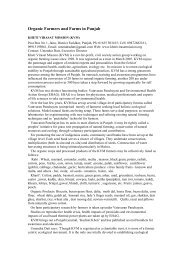Western Ghats Kokum Foundation - Organic Farming Association of ...
Western Ghats Kokum Foundation - Organic Farming Association of ...
Western Ghats Kokum Foundation - Organic Farming Association of ...
You also want an ePaper? Increase the reach of your titles
YUMPU automatically turns print PDFs into web optimized ePapers that Google loves.
Preparation <strong>of</strong> Syrup (Amrut <strong>Kokum</strong>)<br />
Selection <strong>of</strong> fruits ripe, fresh and sound fruits are selected and washed with water.<br />
Stalks are removed. Preparation <strong>of</strong> fruits. The fruits are cut into four pieces by quar tearing.<br />
The pulp and seeds are removed.<br />
The pieces <strong>of</strong> rinds are mixed with sugar in 1:2 (Rind: Sugar) proportion. This<br />
mixture was kept in a big stainless steel vessel for about 7 days. The mixture was well<br />
stirred every day.<br />
After 7 days whole juice from <strong>Kokum</strong> rind was extracted due to osmosis and whole<br />
quantity <strong>of</strong> sugar was dissolved in it. The syrup was strained through 1 mm stainless steel<br />
sieve to separate out the rind portion. The preservative sodium benzoate was added at the<br />
rate <strong>of</strong> 610 mg/kg <strong>of</strong> the finished product.<br />
The syrup was filled in the presterilized glass bottles. The bottles are then crown corked,<br />
labelled and kept in a cool and dry place at ambient temperature conditions.<br />
Ripe <strong>Kokum</strong> Rind Powder<br />
Selection <strong>of</strong> fruits ripe, fresh and sound <strong>Kokum</strong> fruits are selected. The fruits are cut<br />
into pieces. Inner pulp and seeds are removed. The pieces are dried in cabinet drier at 50-<br />
55°C and after drying, powdered in electrically operated grinder. The powder is then sieved<br />
through 1 mm mesh sieve and then packed in polythene bags and kept in a cool and dry<br />
place at ambient temperature conditions.<br />
Brined <strong>Kokum</strong> Juice (Agal)<br />
The fruits are cut into pieces and inner pulp and seeds are utilized. The pulp along<br />
with the seeds is taken into a big stainless steel vessel. The salt at the rate <strong>of</strong> 160g per kg<br />
pulp was added. The mixture was stirred daily for seven days. After seven days the whole<br />
mixture was strained through stainless steel sieve. Thus, brined juice was then filled in<br />
presterilized bottles.<br />
<strong>Kokum</strong> has been traditionally used as acidulent in certain foods in some regions <strong>of</strong><br />
Karnataka and Maharashtra. It is also used to make an attractive red pleasant flavoured<br />
extract for use as a beverage. The kokum fruit is anthelminitic and cardiotonic and used in<br />
piles, dysentery, tumours, pains and heart complaints. Syrup from the fruit juice is given in<br />
bilious affections.<br />
<strong>Kokum</strong> seed (8-10 seed per fruit) is good source <strong>of</strong> fat which is called as "<strong>Kokum</strong><br />
butter" in commerce. <strong>Kokum</strong> seed is a minor oil seed crop; butter has food and non-food<br />
applications. The seeds are decorticated by beating with a rod.<br />
The oil is traditionally extracted by boiling the kernels in water and the oil which<br />
collects at the top is skimmed <strong>of</strong>f. Now a day's oil is obtained by solvent extraction also. The<br />
yield <strong>of</strong> oil (fat) is about 25%. The fat is greasy to feel and whitish-yellow in colour.<br />
75<br />
Resource Book on <strong>Kokum</strong> (Garcinia indica Choisy)<br />
<strong>Western</strong> <strong>Ghats</strong> <strong>Kokum</strong> <strong>Foundation</strong>, Panaji - Goa





